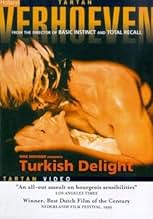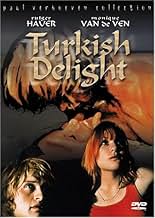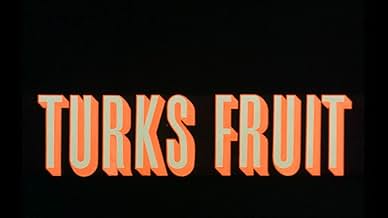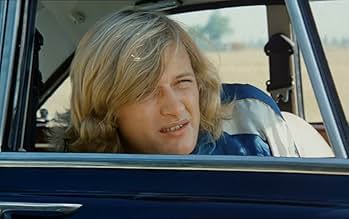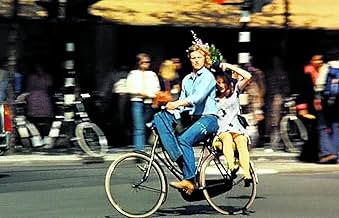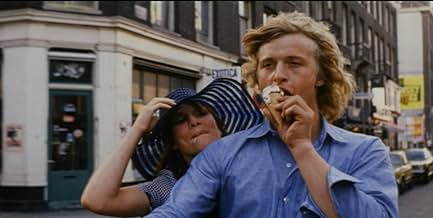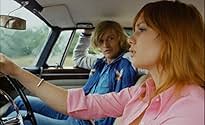NOTE IMDb
7,1/10
12 k
MA NOTE
Un amour de jeunesse est confronté à d'anciens problèmes.Un amour de jeunesse est confronté à d'anciens problèmes.Un amour de jeunesse est confronté à d'anciens problèmes.
- Réalisation
- Scénario
- Casting principal
- Nommé pour 1 Oscar
- 1 victoire et 1 nomination au total
Suze Broks
- Eric's One night stand
- (as Suzie Broks)
Avis à la une
Best Dutch film ever.
A pre action movie Rutger Hauer proves he can act.
The full romantic scrambles this film shows probably hit home for so many people. Hence it's success.
It continues to be successful. It recently played Tokyo again in a few art houses and people were lined up. Not just the Dutch expats either, EVERYBODY.
It well deserved its nomination. If the Genius Kurosawa hadn't been nominated, this would have won.
Rutger, we hardly knew ye. HAIL!
A pre action movie Rutger Hauer proves he can act.
The full romantic scrambles this film shows probably hit home for so many people. Hence it's success.
It continues to be successful. It recently played Tokyo again in a few art houses and people were lined up. Not just the Dutch expats either, EVERYBODY.
It well deserved its nomination. If the Genius Kurosawa hadn't been nominated, this would have won.
Rutger, we hardly knew ye. HAIL!
Few days ago, I watched the documentary Z Channel: A Magnificent Obsession (2004) about a channel that had brought the great and unavailable anywhere else films to its 100, 000 lucky subscribers in LA in 70s - 80s. While enjoying the clips from many Foreign and Independent movies that were the best part of documentary, I was able to recognize the movie that I saw many years ago in Moscow and still remember well, I could not only recall the title. I remember that the movie was Dutch, very erotic in the raw, brutal, twisted yet beautiful and passionate way. Watching "Z Channel..." I was happy to instantly recognize "Turks fruit" (1973) aka "Turkish Delight" made by Paul Verhoeven in 1973. I checked with Netflix, the movie was available; I bumped it up in my queue and just finished watching it. My memory served me well - Verhoeven's early film is as naturalistic, earthy, brutal, erotic, humorous, poetic, poignant, and captivating as I remember it. Based on the novel by Jan Wolker, "Turkish Delight" stars young, hot, very sexy (and I mean it - VERY SEXY) Rutger Hauer as a bohemian free spirited and often cruel sculptor Eric and even younger Monique van de Van as his wife Olga, child-like yet as sensual as Eric was, "the light of his life, the fire of his loins". The film that describes their stormy relationship has become the most financially successful Holland's film that was nominated for an Academy Award for Best Foreign Language film and was proclaimed by Jan Wolker a "75% masterpiece".
There are not very many directors in the world that can create the atmosphere of raw sensuality as well as Verhoeven (of his Dutch period, especially). Verhoeven is known for uncompromising approach to his work, fiery temperament, and aggressive movie-making. Joe Ezsterhaus who worked with Verhoeven on two films said about him: "The guy is like his movies: brilliant, mercurial, very daring, perverse, a wonderful series of paradoxes and contradictions..." "The Turkish Delight" is all that and I love it but I can understand how its graphic sexuality, more than one disgusting and revolting scenes (but they had to be in the movie) and crude behavior may put off a lot of viewers. Be prepared, "Turkish Delight" is delightful but it is very intense and often not easy to watch.
8/10
There are not very many directors in the world that can create the atmosphere of raw sensuality as well as Verhoeven (of his Dutch period, especially). Verhoeven is known for uncompromising approach to his work, fiery temperament, and aggressive movie-making. Joe Ezsterhaus who worked with Verhoeven on two films said about him: "The guy is like his movies: brilliant, mercurial, very daring, perverse, a wonderful series of paradoxes and contradictions..." "The Turkish Delight" is all that and I love it but I can understand how its graphic sexuality, more than one disgusting and revolting scenes (but they had to be in the movie) and crude behavior may put off a lot of viewers. Be prepared, "Turkish Delight" is delightful but it is very intense and often not easy to watch.
8/10
Turkish delight is a book by the Dutch true artist Jan Wolkers: a painter, a sculptor, a writer. Symbol of sexual liberation in the 60's and 70's with a series of books about his youth, freeing himself of protestant chains and the general revolt against the bourgeoisie, Wolkers made himself big. But he became larger than life with his contribution to Dutch culture and the understanding of the Dutch mind. The movie itself is a delight with scenes shot in Amsterdam and the greater Amsterdam area: all that is fashionable passes by, not just sexual freedom and the confrontation with society. And the beauty of both Rutger Hauer and Monique van der Ven, is a well deserved extra.
There are many ways in which love and passion can be manifested in a relationship, but if it is to prevail, it is essential that both sides complement one another, physically, emotionally and psychologically; the feelings borne on the wings of romance must above all else be mutual and deeply instilled on both sides. When they are not, the end result must necessarily be estrangement; it is a law-- not of man, but of nature. In `Turkish Delight,' director Paul Verhoeven dissects a relationship born of passion, examines the ramifications of the attitudes and actions of the individuals involved-- as well as the couple they become-- and offers the results to his audience for consideration. Is it, though, a story of love and passion? Yes. But it comes via a route more analogous to the sensibilities of David Cronenberg than Ang Lee; it is decidedly more Craven than Capra. So don't come to this film expecting tender moments; instead, prepare yourself for an offering that is provocative, that is sexually explicit, and finally, graphic in it's more violent moments. This is a film for neither the fainthearted nor the modest, but for the discerning viewer only.
In the first few minutes of this film, we are introduced to Eric Vonk (Rutger Hauer), an artist with a passion for his work, but even more so for experiences that lean more toward the wanton and carnal in aspect. We instantly become voyeurs as he proceeds to overindulge in a series of lusty encounters, an extreme display of irresponsible debauchery that cannot but impel a most unpropitious and subjective first impression on behalf of the viewer, who is forced to bear witness to a man of obvious and insatiable appetites and a tentative moral code. Or so it would seem, initially.
As the story unfolds, however, we begin to understand Eric and what it is that compels him thus; and it begins with a photograph of a beautiful young woman named Olga (Monique van de Ven), the woman with whom Eric once shared his life, love, passion and, yes, his lust. It is obvious from the outset that she is no longer with him, which evokes the question that has to be asked: `Why?' And from that inauspicious beginning, a picture emerges that may not be pretty, and is, in fact, fairly disconcerting. By the end of the film, though, all questions pertaining to Eric Vonk and the mysterious Olga have been answered. The screen grows dark then; but the images to which the viewer has just been made privy are ones that are going to remain in the mind's eye for some time afterwards.
Working from a screenplay by Gerard Soeteman (adapted from the novel by Jan Wolkers), Verhoeven establishes himself as the antithesis of Nora Ephron, presenting his `love' story in terms that are decidedly raw and primitive. Though he does manage to establish the fact that Eric does have deep love for Olga, it is lust that seemingly dominates the picture, and though there is a dramatic twist to the story, it all comes across more like a twisted fairy tale than anything else. Verhoeven uses violence to express the same sentiments Ephron, for example, does through compassion and empathy. But that is his style. It's his prerogative; it's his turf; it's his film. And Verhoeven as much as says to his audience that if you don't like it, you can leave. It's not as if he doesn't have respect for his viewer, though; rather, it seems as if it's something he simply has not considered.
If you can get past the baggage with which Verhoeven inexplicably saddles his own film, there is an interesting, if not riveting, story to be found. But, like Cronenberg's affinity for slime and things that ooze, Verhoeven apparently cannot escape his affinity for violence, even when it works to his detriment. In the case of this film, it results in certain scenes that are too avant-garde to be effective within the context of the overall film. These are scenes in which Eric is hallucinating or day dreaming about particular aspects of his relationship with Olga. They are abrupt insertions into the narrative that simply do not mesh with the flow of the film. The seam left by the weave, as it were, is just too apparent. Beyond the shock value (which is minimum), it just doesn't work.
On the positive side, Verhoeven does extract worthy performances from his stars, Hauer and van de Ven. Hauer, in his feature film debut (and at this point some eight years away from his American film debut in `Nighthawks') displays a natural ability in front of the camera and seems comfortably uninhibited, which enables him to use his rugged good looks to the best advantage. Eric is a complex character of single minded intent, which Hauer conveys quite ably in his performance. Van de Ven also makes her motion picture debut here, and beyond her obvious beauty there is a definite indication of the talent that would soon bring her international acclaim (though her star has yet to rise above the American landscape). Her portrayal of Olga is convincing, and her myriad charms are neither misplaced nor misused by Verhoeven here. And commendably, she manages to transcend the mere use of her physical attributes and create a memorable character with a truly affecting performance.
The supporting cast includes Tonny Huurdeman (Moeder), Wim van den Brink (Vader) and Dolf de Vries (Paul). This film is definitely not for everyone; it fails as entertainment, but succeeds as an examination of the extremes to which we, as humans, are susceptible. `Turkish Delight,' then, will be received in any number of different ways. Some will be shocked and appalled by what they see on the screen; others will be offended. And still others will understand that what is depicted here is a very real reflection of things that go on in a very real world, as interpreted by Paul Verhoeven. 7/10.
In the first few minutes of this film, we are introduced to Eric Vonk (Rutger Hauer), an artist with a passion for his work, but even more so for experiences that lean more toward the wanton and carnal in aspect. We instantly become voyeurs as he proceeds to overindulge in a series of lusty encounters, an extreme display of irresponsible debauchery that cannot but impel a most unpropitious and subjective first impression on behalf of the viewer, who is forced to bear witness to a man of obvious and insatiable appetites and a tentative moral code. Or so it would seem, initially.
As the story unfolds, however, we begin to understand Eric and what it is that compels him thus; and it begins with a photograph of a beautiful young woman named Olga (Monique van de Ven), the woman with whom Eric once shared his life, love, passion and, yes, his lust. It is obvious from the outset that she is no longer with him, which evokes the question that has to be asked: `Why?' And from that inauspicious beginning, a picture emerges that may not be pretty, and is, in fact, fairly disconcerting. By the end of the film, though, all questions pertaining to Eric Vonk and the mysterious Olga have been answered. The screen grows dark then; but the images to which the viewer has just been made privy are ones that are going to remain in the mind's eye for some time afterwards.
Working from a screenplay by Gerard Soeteman (adapted from the novel by Jan Wolkers), Verhoeven establishes himself as the antithesis of Nora Ephron, presenting his `love' story in terms that are decidedly raw and primitive. Though he does manage to establish the fact that Eric does have deep love for Olga, it is lust that seemingly dominates the picture, and though there is a dramatic twist to the story, it all comes across more like a twisted fairy tale than anything else. Verhoeven uses violence to express the same sentiments Ephron, for example, does through compassion and empathy. But that is his style. It's his prerogative; it's his turf; it's his film. And Verhoeven as much as says to his audience that if you don't like it, you can leave. It's not as if he doesn't have respect for his viewer, though; rather, it seems as if it's something he simply has not considered.
If you can get past the baggage with which Verhoeven inexplicably saddles his own film, there is an interesting, if not riveting, story to be found. But, like Cronenberg's affinity for slime and things that ooze, Verhoeven apparently cannot escape his affinity for violence, even when it works to his detriment. In the case of this film, it results in certain scenes that are too avant-garde to be effective within the context of the overall film. These are scenes in which Eric is hallucinating or day dreaming about particular aspects of his relationship with Olga. They are abrupt insertions into the narrative that simply do not mesh with the flow of the film. The seam left by the weave, as it were, is just too apparent. Beyond the shock value (which is minimum), it just doesn't work.
On the positive side, Verhoeven does extract worthy performances from his stars, Hauer and van de Ven. Hauer, in his feature film debut (and at this point some eight years away from his American film debut in `Nighthawks') displays a natural ability in front of the camera and seems comfortably uninhibited, which enables him to use his rugged good looks to the best advantage. Eric is a complex character of single minded intent, which Hauer conveys quite ably in his performance. Van de Ven also makes her motion picture debut here, and beyond her obvious beauty there is a definite indication of the talent that would soon bring her international acclaim (though her star has yet to rise above the American landscape). Her portrayal of Olga is convincing, and her myriad charms are neither misplaced nor misused by Verhoeven here. And commendably, she manages to transcend the mere use of her physical attributes and create a memorable character with a truly affecting performance.
The supporting cast includes Tonny Huurdeman (Moeder), Wim van den Brink (Vader) and Dolf de Vries (Paul). This film is definitely not for everyone; it fails as entertainment, but succeeds as an examination of the extremes to which we, as humans, are susceptible. `Turkish Delight,' then, will be received in any number of different ways. Some will be shocked and appalled by what they see on the screen; others will be offended. And still others will understand that what is depicted here is a very real reflection of things that go on in a very real world, as interpreted by Paul Verhoeven. 7/10.
Paul Verhoeven is known as provocative filmmaker who likes to create daring visual images. He's mostly known by his Hollywood films with unsteady quality. 'Turkish Delight' was Verhoevens first hit in Netherlands and was voted as best Dutch film of the century. With the very first minutes Verhoeven manages to disturb the viewer and unsuspecting viewer can even start to think - what I just got myself into? Very bold depiction of sex and sexuality doesn't seem forced and even the small bursts of intense violence don't stand out from the rest of the film as some bright (or dark) spots.
'Turkish Delight' is heartwarming and heartbreaking love story between free spirited Olga (Monique van de Ven) and care free sculptor Eric (Rutger Hauer). Both main stars have such a chemistry between them that nothing seems to forced. Their relationship seems as natural as sunshine in Florida (or rain in London).
Very few directors are capable of making such warm films with provocative aplomb and Verhoeven is master at this game.
'Turkish Delight' is heartwarming and heartbreaking love story between free spirited Olga (Monique van de Ven) and care free sculptor Eric (Rutger Hauer). Both main stars have such a chemistry between them that nothing seems to forced. Their relationship seems as natural as sunshine in Florida (or rain in London).
Very few directors are capable of making such warm films with provocative aplomb and Verhoeven is master at this game.
Le saviez-vous
- AnecdotesIn 1973, this was the most successful Dutch movie ever, and with 3.3 million tickets sold, it was still the most attended Dutch movie in The Netherlands during its 50-year anniversary in 2023.
- GaffesDuring the thunderstorm, when Eric is walking towards Olga who is standing outside in the rain, the reflection of a spotlight providing "lightning" can be seen on the surface of the door.
- ConnexionsFeatured in Adam & Yves (1974)
- Bandes originalesMeisjes met rode haren
(uncredited)
Written by Manfred Oberdörffer (uncredited) & Hans Georg Moslener (uncredited)
Dutch lyrics by Pim van Zijl (uncredited)
Performed by Arne Jansen (uncredited)
Meilleurs choix
Connectez-vous pour évaluer et suivre la liste de favoris afin de recevoir des recommandations personnalisées
- How long is Turkish Delight?Alimenté par Alexa
Détails
- Date de sortie
- Pays d’origine
- Langues
- Aussi connu sous le nom de
- Turkish Delight
- Lieux de tournage
- Société de production
- Voir plus de crédits d'entreprise sur IMDbPro
Box-office
- Budget
- 800 000 NLG (estimé)
Contribuer à cette page
Suggérer une modification ou ajouter du contenu manquant

